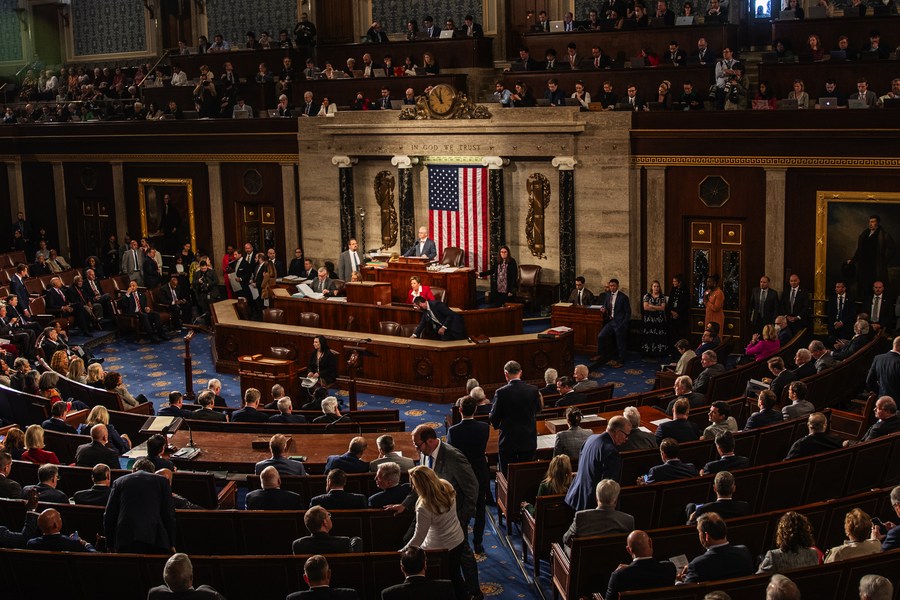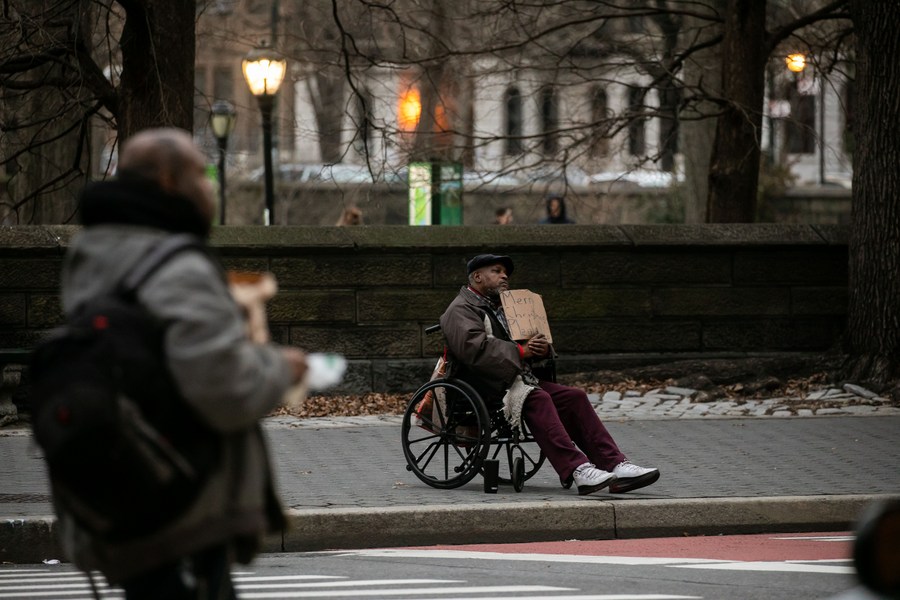

Representatives cast their votes for House Speaker in the House chamber in Washington, D.C., the United States, on Oct. 18, 2023. (Photo by Aaron Schwartz/Xinhua)
If asked to describe U.S. politics for the year 2023 in just one word, it would be "chaos."
NEW YORK, Dec. 27 (Xinhua) -- If asked to describe U.S. politics for the year 2023 in just one word, it would be "chaos."
Washington has witnessed an intensification of fierce confrontations between the Democratic and Republican parties, exposing a perceived dysfunction and disorder of the American democratic system.
Former President Donald Trump faces criminal charges for mishandling classified documents, making him the first ex-president under criminal prosecution in U.S. history.
Current President Joe Biden's son, Hunter Biden, is dealing with accusations related to taxes and firearms, the first criminal charges against a sitting president's child.
Earlier in December, House Republicans voted to formalize an impeachment inquiry into Biden, highlighting the stark partisan lines that dominate the country's political life.
Rewind to January, House Republicans spent four days and 15 tries just to pick their speaker, Rep. Kevin McCarthy. He got the boot nine months later, leaving the whole place leaderless and paralyzed for three weeks while they duked it out over who should fill the spot.
"The U.S. now is confronting a very unique political situation. Not only is there a huge divide between Republicans and Democrats, but there's also a huge divide within each of the political parties between, for example, moderate Republicans and conservative Republicans," Denis Simon, a distinguished fellow at the Institute for China-America Studies, told Xinhua in a recent interview.
"So the tension is within parties, and the tension is between parties, shaping the American political situation in very negative ways. And it is having a major impact on the way people view the political system, particularly in terms of the role of government," said Simon, also former executive vice chancellor of Duke Kunshan University.
Renowned American economist Jeffrey Sachs told Xinhua that the dysfunction of U.S. political institutions has worsened due to corruption in campaign funds from the wealthy, major corporations and specific interest groups. This has made policies by Congress and the White House deviate from public interests, eroding public confidence in the government to historic lows.
A whopping 63 percent of Americans have little or no confidence in the future of the U.S. political system, according to a latest Pew Research Center poll. Congress, the Supreme Court, and the political parties aren't exactly winning any popularity contests either.
UNCERTAIN SOFT LANDING
The U.S. economy seems to have temporarily avoided the recession risks predicted by many economists, but whether a "soft landing" can be achieved remains uncertain.

A man in a wheelchair holds a cardboard and begs for help in New York, the United States, on Dec. 24, 2023. (Photo by Michael Nagle/Xinhua)
In 2023, the Federal Reserve, through a series of interest rate hikes and balance sheet reduction measures, has kept pushing inflation levels lower, but the index remains high above its long-term target of 2 percent.
The aggressive interest rate hikes, however, briefly caused financial turmoil in the United States, greatly affecting the world and leading to the closure of several banks in the United States and Europe.
"The U.S. economy has held up rather well this year with inflation coming down, the economic recovery continuing and unemployment remaining at close to record low levels," Desmond Lachman, a senior fellow at the American Enterprise Institute and a former official at the International Monetary Fund, told Xinhua.
"However, knowing that monetary policy operates with long and variable lags and that the commercial real estate bubble has burst, the jury is still out as to whether the Fed will have succeeded in securing a soft economic landing," said Lachman.
"The continued political dysfunction in Washington that has put the public finances on an unsustainable path as underlined by an 8 percent of GDP budget deficit at a time of full employment and by a public debt that is well on its way to exceed the level recorded during the Second World War," he said.
"The regional banking crisis centered on Silicon Valley Bank and First Republic Bank early this year that could be the forerunner of more financial system problems next year as a delayed response to the Fed's hawkish monetary policy stance," said Lachman.
Despite the year-on-year decline in the Consumer Price Index (CPI) from over 6 percent at the beginning of the year to around 3 percent, with prices remaining high, middle- and low-income Americans continue to bear a heavy economic burden. Recent polls show most Americans feel the U.S. economy is in tough shape and getting worse.
"The domestic economy is filled with great anxiety. First of all, we have the continued problem of the income inequality gap. The rich are getting richer, and the poor therefore seem to be getting poorer," said Simon.
Regardless of income, households said they are feeling the pressure at about the same amount, according to a recent survey by Bankrate. Sixty percent of respondents in the lowest-income households, making under 50,000 U.S. dollars a year, said the economy feels like it is in a recession. Of those in higher-income households making more than 100,000 dollars annually, 61 percent agreed.
In their U.S. Economic Outlook released in December, Wells Fargo economists noted resiliency in 2023, but growth in 2024 looks to be a sub-trend, at best.
"There are unmistakable signs that momentum in the economy is downshifting, and cracks are beginning to appear in the household sector," said the outlook.
"We readily acknowledge, however, the economy could achieve a 'soft landing' in 2024. But even if an economic contraction is avoided, the pace of real GDP growth over the next few quarters likely will be sub-trend due to the restrictive stance of monetary policy," it said.
MIDEAST POLICY BACKFIRES
This year, as the Ukraine crisis lingers, a new round of the Palestinian-Israeli conflict erupted in a large scale. For the United States, which has long pursued the domination over the Middle East, this is akin to a "gray rhino" event.

People rally to support Palestinians and protest against Israel's blockade of the Gaza Strip, at the Union Square in San Francisco, California, the United States, Dec. 23, 2023. (Photo by Li Jianguo/Xinhua)
The Biden administration's original diplomatic agenda was disrupted, and its responses to the two conflicts are clearly seen as "double standards," drawing widespread criticism both internationally and domestically. As a result, the administration has been facing pressure over its policies addressing both domestic and foreign issues.
The White House's relentless provision of military aid to Ukraine came under fierce attack from Republicans, and a "Ukraine fatigue" in Congress became apparent. A Gallup poll released in November showed that 41 percent of Americans believed the U.S. was doing too much to help Ukraine, a 12-percentage-point increase from 29 percent in June.
Since the outbreak of the new conflict in the Gaza Strip, more than 20,000 people have died there.
The United States, which has long touted itself as a "human rights defender," not only toughened its military presence in the Middle East and provided substantial military support to Israel, but also repeatedly obstructed relevant resolutions in the United Nations Security Council, drawing widespread criticism from across the world.
Recent polls in the United States show a majority of young voters disapprove of the Biden administration's handling of the Palestine-Israel conflict, posing a potential challenge to the president's reelection prospects.
SOCIAL ISSUES WORSEN
Throughout the year, persistent issues in the American society, such as gun violence, racial tensions, illegal immigration, and drug abuse, continue to worsen.

People attend a candlelight vigil for victims of a school mass shooting in Uvalde, Texas, the United States on May 24, 2023. (Xinhua/Wu Xiaoling)
According to statistics from the "Gun Violence Archive" website, the total number of gun violence deaths in the United States this year amounted to 42,069 as of Dec. 22.
The new Palestinian-Israeli conflict exacerbated the existing social rifts among the American people, with hate crimes increasing significantly.
Republican-controlled "red state" governments continue to transport illegal immigrants into Democratic-controlled "blue states," causing Washington D.C., New York, Chicago and other Democratic Party-governed areas to be overwhelmed.
Most Americans feel anxious and insecure about the country's future. The latest Reagan National Defense Survey shows that as many as 70 percent of people believe the country is on the wrong path.
"As for the main challenges in 2024, I would say that getting through the 2024 election cycle without blemishes, controversies and disinformation is probably the biggest one. Of course, Donald Trump and his numerous cases loom over the election cycle and U.S. domestic politics," Sourabh Gupta, a senior fellow at the Washington-based Institute for China-America Studies, told Xinhua.
"Additionally, the economy is expected to soften in 2024, making Biden more vulnerable in his run for re-election. Depending on where Russia and the oil producing Gulf states steer the price of oil in global markets, this too could add to Biden's troubles," said Gupta.
The first training camp of the Center of Innovation and Maritime Excellence, supported by Chinese companies, was opened Thursday in Djibouti City, the capital o...